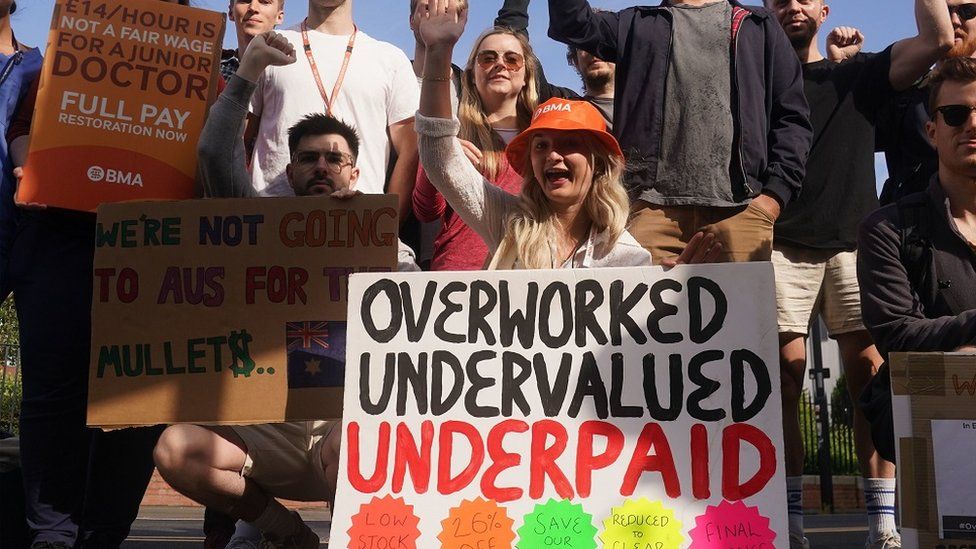
By Chris Mason
Political editor, BBC News
“So, are we getting a pay rise, then?”
The question from the policeman on the gates of Downing Street as I arrived for the prime minister’s news conference could have been asked by more than a million public sector workers.
The answer, I told him an hour later as I left, was yes – 7%.
The big question now is what police officers and others make of what they have been offered.
The government has decided to accept the recommendations of the pay review bodies, the groups that recommend how much of a pay rise various parts of the public sector should get.
At the core of all of this are choices: gnarly choices, tricky trade-offs.
What pay rises have been offered?
Teachers in England – 6.5%Junior doctors in England – 6% + £1,250 consolidated increaseConsultants, dentists and GPs in England – 6%Police officers in England and Wales – 7%Prison officers in England and Wales – 7% and more for support gradesArmed forces across the UK – 5% + £1,000 consolidated increaseSenior civil servants – 5.5%
The prime minister doesn’t want to borrow money to fund the pay rises.
Borrowing and debt are already high, and more borrowing, he fears, would fuel inflation, which is also high.
And he doesn’t want to put up taxes either. Yes, they are high by historic standards too.
So how is this being paid for?
Ministers have been scrabbling about looking for money within existing budgets. The additional cost of these plans is around £2bn.
About half of that, they hope, will be raised by cranking up the cost of visas and the surcharge that migrants have to pay to use the NHS.
What about the other half, the best part of a billion pounds?
This is the chunk being looked for by what are described by those in government as “underspends and reallocations.”
They are not keen on using the word cuts.
Whatever the word you use, what this amounts to is money that had been allocated to one pot, being taken out of it and put into the pay pots.
The government, just like the rest of us, can’t spend the same pound twice.
And so, the priority has still to be decided. So, what won’t be happening because of these pay rises that might otherwise have happened?
Officials haven’t given many examples, even though the process of moving money around has been completed.
Two of the examples offered are a freeze on civil servant recruitment in the Ministry of Defence and offering fewer traineeships in the civil service.
And where are Labour in all this?
It is striking that Keir Starmer did not directly criticise the government’s announcement. They are offers for workers and unions to consider and he had little to add, he said.
The big question now is what difference will these pay offers make? Will they stop the strikes?
The leadership of the teaching unions have welcomed the settlement they have been offered.
So much so that Mary Bousted, the joint general secretary of the National Education Union, put her name to a joint statement with the prime minister.
The Sunak-Bousted double act is not something many would have imagined a few months back.
But, as ever, it will be up to union members to decide whether they accept these suggestions.
And some are lukewarm at best.
The doctors’ union the BMA and Unite, a huge trade union, are both sounding very sceptical.
It is a reminder than in an era of high taxes, high government spending, high inflation and stagnant growth, there are few easy answers for any of us: workers, unions, opposition parties or the government.
>>> Read full article>>>
Copyright for syndicated content belongs to the linked Source : BBC News – https://www.bbc.co.uk/news/uk-politics-66195354?at_medium=RSS&at_campaign=KARANGA